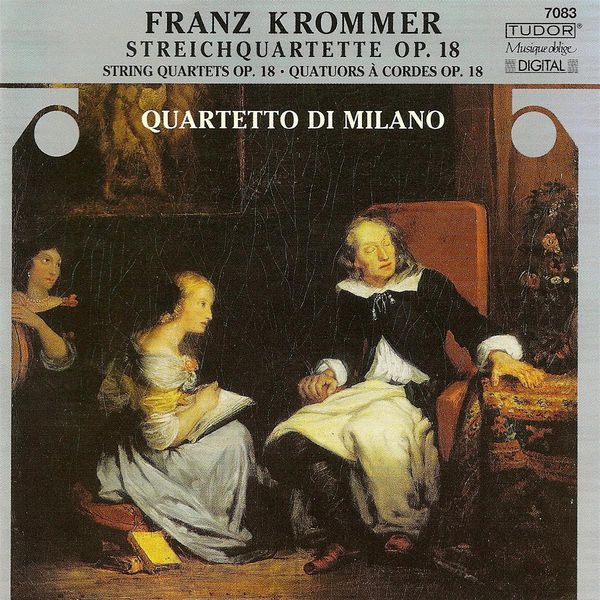
Musique illimitée
Écoutez cet album en haute-qualité dès maintenant dans nos applications
Démarrer ma période d'essai et lancer l'écoute de cet albumProfitez de cet album sur les apps Qobuz grâce à votre abonnement
SouscrireProfitez de cet album sur les apps Qobuz grâce à votre abonnement
Téléchargement digital
Téléchargez cet album dans la qualité de votre choix
Langue disponible : anglais
Viennese composer Franz Krommer was born in Bohemia and also used his birth name, Frantisek Kramar. He was younger than Haydn but slightly older than Beethoven, who at first regarded him as potential competition in the string quartet genre but then stopped worrying. That was because there is little expression in quartets like these; as Quartetto di Milano member Thomas Wicky-Borner put it in his notes, Krommer "hardly ever reveals himself to us in his compositions." Written in the late 1790s, these works belong with the Classical era and not the Romantic, and in the minuet form, where Haydn had said everything that could be said, they are not very interesting. That said, Krommer did absorb one major aspect of Beethoven's string quartet language: like Beethoven's, these are not quartets for amateurs. The first-violin parts require a serious player, and these three quartets in general abound with flashy contrasts in texture and in passages that are big without being quasi-orchestral. The last movement of the String Quartet in D major, Op. 18/1, is an example of a movement that follows Haydn's formal designs but gooses them with fancy fingerwork. The outer movements of all three of these quartets are exciting for the listener, with a vigor that sets them apart from Hummel's expansive structure, and they pose challenges to the players that the Quartetto di Milano surmounts for the most part. Sometimes the group lays on Beethovenian intensity where the music can't really support it, and sometimes when it really digs into the strings they are not perfectly in tune. For the most part, however, this is a good introduction to the string quartets of a nearly forgotten composer of the First Viennese School.
© TiVo
Vous êtes actuellement en train d’écouter des extraits.
Écoutez plus de 100 millions de titres avec votre abonnement illimité.
Écoutez cette playlist et plus de 100 millions de titres avec votre abonnement illimité.
À partir de 12,49€/mois

Quartetto di Milano, Ensemble
Quartetto di Milano, Ensemble
Quartetto di Milano, Ensemble
Quartetto di Milano, Ensemble
Quartetto di Milano, Ensemble
Quartetto di Milano, Ensemble
Quartetto di Milano, Ensemble
Quartetto di Milano, Ensemble
Quartetto di Milano, Ensemble
Quartetto di Milano, Ensemble
Quartetto di Milano, Ensemble
Quartetto di Milano, Ensemble
Chronique
Viennese composer Franz Krommer was born in Bohemia and also used his birth name, Frantisek Kramar. He was younger than Haydn but slightly older than Beethoven, who at first regarded him as potential competition in the string quartet genre but then stopped worrying. That was because there is little expression in quartets like these; as Quartetto di Milano member Thomas Wicky-Borner put it in his notes, Krommer "hardly ever reveals himself to us in his compositions." Written in the late 1790s, these works belong with the Classical era and not the Romantic, and in the minuet form, where Haydn had said everything that could be said, they are not very interesting. That said, Krommer did absorb one major aspect of Beethoven's string quartet language: like Beethoven's, these are not quartets for amateurs. The first-violin parts require a serious player, and these three quartets in general abound with flashy contrasts in texture and in passages that are big without being quasi-orchestral. The last movement of the String Quartet in D major, Op. 18/1, is an example of a movement that follows Haydn's formal designs but gooses them with fancy fingerwork. The outer movements of all three of these quartets are exciting for the listener, with a vigor that sets them apart from Hummel's expansive structure, and they pose challenges to the players that the Quartetto di Milano surmounts for the most part. Sometimes the group lays on Beethovenian intensity where the music can't really support it, and sometimes when it really digs into the strings they are not perfectly in tune. For the most part, however, this is a good introduction to the string quartets of a nearly forgotten composer of the First Viennese School.
© TiVo
À propos
- 1 disque(s) - 12 piste(s)
- Durée totale : 01:06:57
- Artiste principal : Quartetto di Milano
- Compositeur : Franz Krommer
- Label : Tudor
- Genre : Classique
 Pourquoi acheter sur Qobuz ?
Pourquoi acheter sur Qobuz ?
-
Streamez ou téléchargez votre musique
Achetez un album ou une piste à l’unité. Ou écoutez tout notre catalogue en illimité avec nos abonnements de streaming en haute qualité.
-
Zéro DRM
Les fichiers téléchargés vous appartiennent, sans aucune limite d’utilisation. Vous pouvez les télécharger autant de fois que vous souhaitez.
-
Choisissez le format qui vous convient
Vous disposez d’un large choix de formats pour télécharger vos achats (FLAC, ALAC, WAV, AIFF...) en fonction de vos besoins.
-
Écoutez vos achats dans nos applications
Téléchargez les applications Qobuz pour smartphones, tablettes et ordinateurs, et écoutez vos achats partout avec vous.



